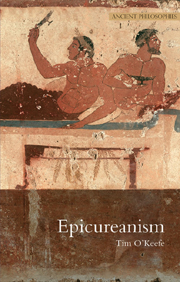Book contents
- Frontmatter
- Contents
- Preface
- Acknowledgements
- Sources and abbreviations
- Chronology
- 1 Introduction: the life of Epicurus and the history of Epicureanism
- I Metaphysics and physics: introduction and overview
- II Epistemology: introduction and overview
- III Ethics: introduction and overview
- Glossary of terms
- Notes
- Further reading
- Bibliography
- Index
III - Ethics: introduction and overview
- Frontmatter
- Contents
- Preface
- Acknowledgements
- Sources and abbreviations
- Chronology
- 1 Introduction: the life of Epicurus and the history of Epicureanism
- I Metaphysics and physics: introduction and overview
- II Epistemology: introduction and overview
- III Ethics: introduction and overview
- Glossary of terms
- Notes
- Further reading
- Bibliography
- Index
Summary
Epicurean ethics does not follow directly from their metaphysics and epistemology, but it has close connections to both. For almost all Greek philosophers of the time, the fundamental questions of ethics were (i) what is the highest good and (ii) how do you attain it, with the highest good being what is desirable for its own sake and not for the sake of anything else. Epicurus declares pleasure to be the highest good. In a world without purpose and plan, we can still observe the behaviour of animals and see that all of them (including human beings) pursue only pleasure for its own sake and likewise shun pain, establishing the intrinsic desirability of pleasure and badness of pain. The goodness of pleasure and badness of pain are also supposed to be evident in our experience (Chapter 11).
From this simple starting-point, however, Epicurus quickly develops a distinctive version of hedonism by asserting that mental pleasures and pains are greater than mere bodily pleasures and pains. Furthermore, lack of bodily pain and freedom from mental turmoil are not neutral states, but themselves pleasurable: indeed, the highest sorts of pleasures. So Epicurean hedonism turns out to be the pursuit of tranquillity, attained primarily by shedding the vain and empty desires that lead to anxiety and by leading a moderately ascetic life (Chapter 12).
Mainstream Greek ethics also stresses the central place of developing the virtues – excellences of character and thought – in attaining a happy life, and Epicurus is no exception. Epicurean hedonism is an enlightened hedonism, which recognizes that one must be brave, temperate and wise in order to live pleasantly. But Epicurus is unusual in insisting that the virtues are only instrumental goods, good only for the sake of the pleasure they produce, instead of being good for their own sake. Likewise, philosophy itself is needed to attain pleasure, but has no intrinsic value (Chapter 13).
Information
- Type
- Chapter
- Information
- Epicureanism , pp. 107 - 110Publisher: Acumen PublishingPrint publication year: 2009
